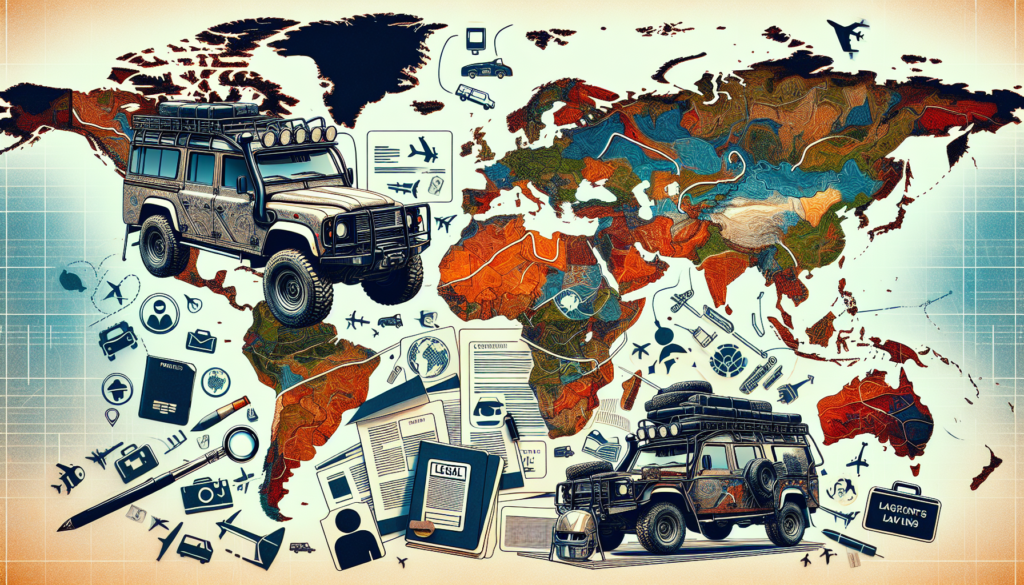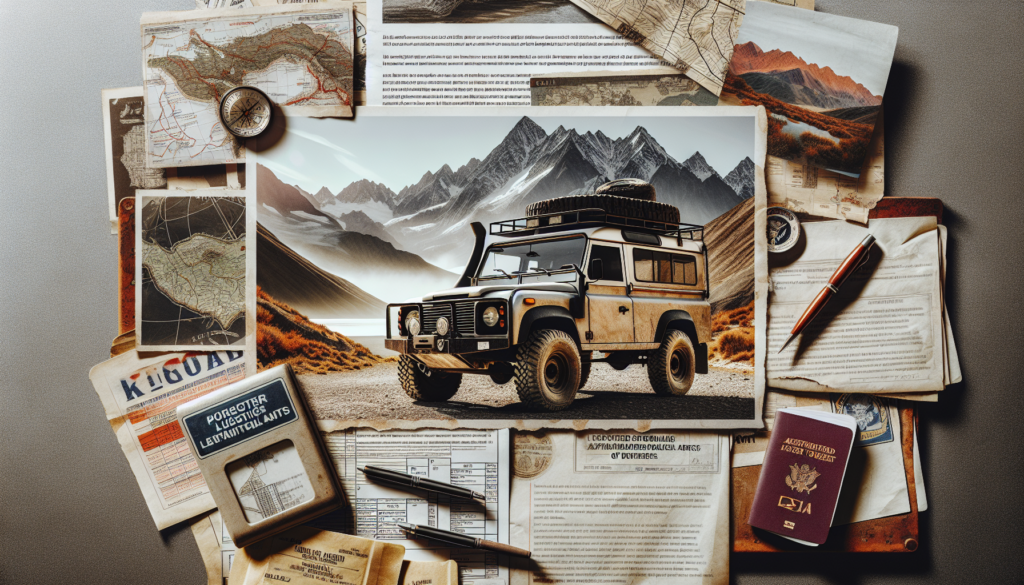So, you’re getting ready for your exciting overlanding adventure, but have you considered the legal aspects? In this article, we’ll take a closer look at the important legal considerations you need to keep in mind while exploring the great outdoors. From permits and regulations to vehicle and camping restrictions, we’ll cover it all to ensure your overlanding experience is not only thrilling but also compliant with the law. Let’s dive into the legal world of overlanding and make sure you’re well-prepared for your next expedition. Overlanding is an exciting and adventurous way to explore new places, but it’s important to be aware of the legal aspects involved. From licensing and registration to road traffic laws and safety equipment, understanding and complying with the regulations is crucial for a smooth and enjoyable overland journey. In this article, we will delve into various legal aspects of overlanding, providing you with comprehensive information to ensure a hassle-free experience. So buckle up and let’s get started!
Vehicle Regulations
When it comes to licensing and registration, it is essential to ensure that your vehicle is properly licensed and registered. This includes obtaining the necessary permits and documentation required by the authorities in the country you are traveling to. It is advisable to research and familiarize yourself with the specific requirements beforehand to avoid any inconvenience or legal complications during your overland adventure.
Vehicle Load Limits
Another important consideration is adhering to vehicle load limits. Overloading your vehicle can compromise its safety and stability, potentially leading to accidents or damage. Each vehicle has a specified weight capacity, and it is vital to stay within those limits. Distribute the weight evenly and secure the items properly to minimize any risks.
Modifications and Safety Standards
Before embarking on your overlanding journey, it is crucial to ensure that your vehicle complies with safety standards and regulations. Any modifications made to your vehicle should meet legal requirements, especially if they potentially affect the safety and functionality of the vehicle. Check with local authorities and regulations regarding the modifications you intend to make to ensure compliance.
Road Traffic Laws
Speed Limits
Obeying speed limits is not only a legal obligation but also crucial for your safety and the safety of others on the road. Speed limits may vary from country to country, as well as within different regions or road types. It is your responsibility as an overlander to be aware of and adhere to the speed limits at all times.
Traffic Signs and Signals
Understanding and following traffic signs and signals is of utmost importance to ensure a smooth and safe journey. These signs and signals convey vital information and instructions, such as speed limits, right of way, parking restrictions, and more. Familiarize yourself with the common traffic signs and signals in the countries you plan to visit to avoid any legal complications or confusion on the road.
Right of Way
Respecting the right of way is crucial for maintaining traffic flow and preventing accidents. Different countries may have slightly different rules regarding right of way, so it is necessary to understand and adhere to the rules of the road in each country you travel through. Yield to pedestrians, cyclists, and other vehicles as stipulated by the local laws and regulations.
Seatbelt and Child Restraint Laws
The safety of all passengers, including yourself, is paramount. Make sure everyone in the vehicle is wearing their seatbelts at all times, regardless of the regulations in the country you are traveling through. If you are traveling with children, be aware of child restraint laws and ensure that appropriate car seats or restraints are used according to the age and size of the child.
Drinking and Driving
Drinking and driving is illegal and highly dangerous. It puts your life, the lives of your passengers, and the lives of others on the road at risk. Never consume alcohol before or during driving. Even if the legal blood alcohol limit is higher in certain countries, it is best to completely refrain from drinking and driving for your safety and the safety of others.
Mobile Phone Use
Distracted driving is a significant hazard on the road. Using a mobile phone while driving not only diverts your attention but can also lead to accidents. Many countries now have strict laws prohibiting the use of mobile phones while driving, unless you have a hands-free device. To stay safe and legal, avoid using your phone unless it is absolutely necessary and ensure you comply with local laws.
Off-Road and Wilderness Regulations
Protected Areas and Permits
When venturing off-road or into wilderness areas, it is crucial to respect and comply with protected area regulations. Many areas require permits for entry or have specific rules and restrictions to preserve the environment and wildlife. Research and obtain the necessary permits beforehand, and be mindful of any designated areas that may be off-limits for vehicle access.
Camping and Campfire Regulations
Camping is often an integral part of overlanding. However, it is important to be aware of camping and campfire regulations in the areas you plan to visit. Some areas may have restrictions on where you can camp or rules regarding open fires. Follow designated camping areas and always practice Leave No Trace principles to minimize your impact on the environment.
Trail Damage and Environmental Impact
As an overlander, you have a responsibility to minimize your impact on the environment and protect fragile ecosystems. Stay on designated roads and trails to avoid damaging vegetation and wildlife habitats. Avoid littering, dispose of waste responsibly, and be conscious of your environmental footprint throughout your journey.
Wildlife Protection Laws
Respecting wildlife and their habitats is vital for their conservation. Familiarize yourself with wildlife protection laws in the countries you plan to visit to ensure that you do not engage in any activities that could harm or disturb wildlife. Observe animals from a safe distance and never feed or approach them. Remember that you are a guest in their home and should treat them with respect and care.

Border Crossings
Passports and Visas
Crossing international borders during your overlanding adventure requires proper documentation. Ensure that your passport is valid for the duration of your trip and check the visa requirements for each country you plan to visit. Some countries offer visa-on-arrival, while others may require a pre-approved visa. Research and apply for visas well in advance to avoid any last-minute complications or legal issues.
Vehicle Import and Export
If you plan to bring your vehicle across international borders, you need to familiarize yourself with vehicle import and export regulations. Some countries have specific rules regarding vehicle importation, such as temporary import permits or customs declarations. Make sure to gather all the required documentation and follow the procedures outlined by the relevant authorities to avoid any delays or legal complications.
Customs Regulations
Customs regulations vary from country to country, and it is essential to be aware of the restrictions and allowances. Declare any items that may be subject to customs duties or restrictions, such as alcohol, tobacco, or valuable goods. Failure to comply with customs regulations can result in penalties or confiscation of goods, so make sure you understand and adhere to the rules.
Temporary Importation Permits
For some countries, you may need to obtain a temporary importation permit for your vehicle. This permit allows you to temporarily bring your vehicle into the country without paying import duties or taxes. Research the requirements for each country and apply for the necessary permits in advance to ensure a smooth border crossing.
Carnet de Passage
A Carnet de Passage is an international customs document that allows temporary importation of vehicles without paying import duties or taxes. It serves as a guarantee to the authorities that the vehicle will be taken out of the country. Check if the countries you plan to visit require a Carnet de Passage and obtain one if necessary to facilitate hassle-free border crossings.
Insurance and Liability
Third-Party Liability Insurance
Before embarking on your overlanding journey, ensure that you have adequate third-party liability insurance. This insurance provides coverage for damages or injuries caused to third parties in the event of an accident. It is a legal requirement in many countries and protects you from potential legal and financial liabilities.
Comprehensive Insurance
In addition to third-party liability insurance, comprehensive insurance is highly recommended. This type of insurance covers damage to your own vehicle and theft. It can provide peace of mind knowing that you are protected financially in case of unexpected events such as accidents, theft, or vandalism. Research different insurance providers and policies to find the coverage that suits your needs.
Medical Evacuation Coverage
Overlanding can take you to remote and isolated areas where access to medical facilities may be limited. It is crucial to have medical evacuation coverage to ensure that you can receive timely and appropriate medical assistance if needed. This coverage can cover the costs of medical evacuation to a suitable medical facility, providing you with an added layer of security during your journey.
Travel Insurance
In addition to vehicle insurance, consider obtaining travel insurance that covers other aspects of your trip such as trip cancellation, personal belongings, and personal liability. Travel insurance offers additional protection and peace of mind, ensuring that you are covered in case of unforeseen circumstances or emergencies during your overlanding adventure.

Tolls and Road Taxes
Road Tolls and Fees
Some countries may have toll roads or specific fees for using certain roads or bridges. Make sure to research and budget for any road tolls or fees that may be applicable to your route. Keep some local currency or electronic payment methods handy to pay the tolls or fees promptly and avoid any legal complications.
Vignettes and Stickers
Certain countries may require the purchase and display of vignettes or stickers on your vehicle to indicate payment of road taxes or access to specific areas. These are typically valid for a specific period and should be displayed conspicuously on your windshield or another visible location. In some countries, failure to display the required vignette or sticker could result in fines or penalties.
Law Enforcement
Traffic Stops and Checks
It is not uncommon to encounter law enforcement officers conducting routine traffic stops and checks during your overland journey. If you are stopped by the authorities, remain calm and cooperative. Follow their instructions and provide them with the necessary documentation and information they request. Remember that cooperation and respect can go a long way in resolving any issues or concerns quickly and amicably.
Penalties and Fines
Violating traffic laws or regulations can result in fines or penalties. The severity of these penalties may vary from country to country, and even within different regions. It is important to familiarize yourself with the local penalties for traffic violations in each country you travel through, and strictly adhere to the traffic laws to avoid unnecessary legal complications or financial burdens.
Towing and Impoundment
If your vehicle is towed or impounded for any reason, such as illegal parking or violating certain regulations, it can be a stressful and inconvenient experience. To avoid such situations, always park in designated areas and adhere to parking regulations. If your vehicle is towed or impounded, contact the local authorities to determine the necessary steps to retrieve it. Pay any fines or penalties promptly to resolve the matter efficiently.
Bribery and Corruption
While traveling, it is essential to maintain integrity and avoid engaging in bribery or corruption practices. Bribing law enforcement officers or other authorities is illegal and can lead to serious consequences. If you encounter a situation where you believe you are being solicited for a bribe, maintain your composure and politely refuse. It is always best to comply with legal procedures and resolve any issues through official channels.
Safety Equipment
First Aid Kit
Having a well-stocked first aid kit is essential for any overlanding adventure. It should include basic medical supplies such as bandages, antiseptic ointment, pain relievers, and any prescription medications you or your passengers may require. Familiarize yourself with the contents of the first aid kit and ensure that it is readily accessible in case of emergencies.
Fire Extinguisher
A fire extinguisher is a critical safety item to have in your vehicle. It can help extinguish small fires and prevent them from spreading. Carry a fire extinguisher that is appropriate for combating vehicle fires and ensure it is easily accessible in case of emergencies. Regularly check the gauge and expiration date to ensure that it is in working condition.
Emergency Triangle
An emergency triangle is a visual signal used to warn approaching vehicles of a potential hazard or a stationary vehicle. It is a legal requirement in many countries and should be set up a safe distance behind your vehicle if you break down or encounter an emergency situation on the road.
Reflective Vest
A reflective vest increases your visibility to other motorists, especially in low-light conditions or when dealing with an emergency situation on the road. It is recommended to carry reflective vests for all occupants of the vehicle and wear them when necessary, such as during roadside repairs or breakdowns.
Spare Tire and Jack
Carrying a spare tire and a functional jack is essential for dealing with tire punctures or blowouts during your overlanding journey. Ensure that the spare tire is properly inflated and in good condition. Familiarize yourself with the process of changing a tire to minimize any delays or challenges when faced with a flat tire.
Visibility and Lighting Equipment
Maintaining proper visibility on the road is crucial for your safety and the safety of other road users. Regularly check and clean your vehicle’s headlights, taillights, turn signals, and brake lights. Replace any faulty bulbs promptly to ensure optimal visibility to other motorists.
Community Guidelines
Respecting Local Customs and Traditions
As an overlander, it is important to respect the local customs and traditions of the communities you encounter. This includes being respectful of dress codes, cultural practices, and religious sites. Educate yourself about the local customs before entering a new region to avoid inadvertently causing offense or disrespect.
Minimizing Noise and Disturbance
Maintaining a quiet and peaceful environment is not only considerate towards other travelers but also shows respect for local communities and wildlife. Avoid excessive noise, especially during quiet hours or in residential areas. Be mindful of the volume of music, generators, or any other noise-producing equipment to minimize disturbance.
Staying on Designated Roads and Trails
Respecting designated roads and trails helps protect the environment and prevents damage to sensitive ecosystems. Avoid off-roading or driving on unauthorized routes, as it can lead to erosion, destruction of vegetation, and harm to wildlife habitats. Stick to established roads and trails and obtain necessary permissions if venturing off the beaten path.
Proper Waste Disposal
Proper waste disposal is essential for maintaining the cleanliness of the areas you visit and minimizing your impact on the environment. Pack out all your trash and dispose of it responsibly in designated waste disposal facilities. Avoid littering and practice Leave No Trace principles by leaving the natural areas as pristine as you found them.
Interacting with Wildlife and Livestock
When encountering wildlife or livestock during your overlanding journey, it is important to keep a safe distance and avoid causing any distress or harm. Do not approach or feed wild animals, as this can disrupt their natural behavior and create dependency on human food. Respect wildlife and their habitats by observing them from a distance and enjoying their presence responsibly.
Supporting Local Economies
Supporting local economies can have a positive impact on the communities you visit. Whenever possible, choose to purchase goods and services from local vendors, artisans, and establishments. This helps to contribute to the local economy and ensure that the benefits of tourism are shared among the local population.
Legal Resources and Support
National and Local Authorities
In case of any legal issues or emergencies during your overlanding journey, it is essential to have contact information for national and local authorities. Research and compile a list of emergency helpline numbers, police stations, and other relevant organizations in the countries you plan to travel through. This information can be invaluable in times of need.
Embassies and Consulates
Embassies and consulates can provide valuable support and assistance to travelers in foreign countries. Familiarize yourself with the location and contact details of your country’s embassy or consulate in the countries you visit. They can offer guidance, help with legal matters, and provide consular services if needed.
Legal Consultants and Services
In complex legal situations, seeking professional legal advice may be necessary. Research and identify legal consultants or services that specialize in the laws and regulations of the countries you plan to visit. Having access to reliable legal resources can help you navigate any legal challenges that may arise during your overlanding journey.
In conclusion, overlanding provides a unique opportunity to explore new places and embark on unforgettable adventures. However, it is essential to be well-informed about the legal aspects that come with this form of travel. From vehicle regulations and road traffic laws to community guidelines and legal support, understanding and complying with the regulations is key to ensuring a safe and enjoyable overland journey. By following the guidelines outlined in this article and respecting the laws and customs of the countries you visit, you can have a rewarding overlanding experience while staying on the right side of the law. So, go out there, explore responsibly, and make lasting memories on your overlanding adventure!

